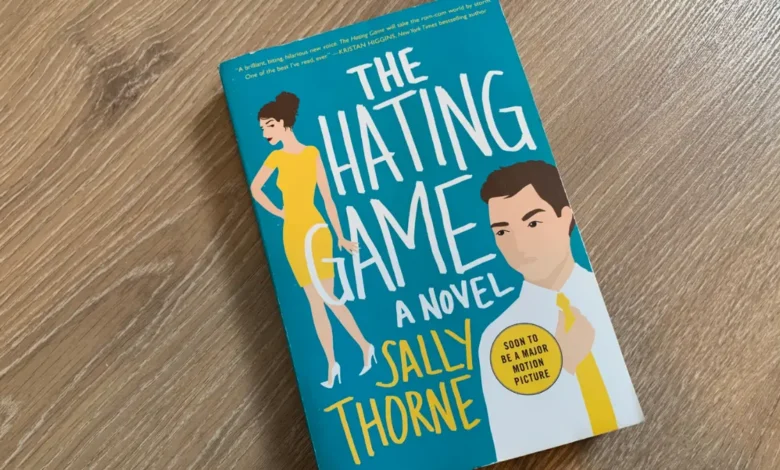The Hating Game Review: A Unique Twist on Office Romance

Introduction
When it comes to office romance novels, the premise is often familiar: two colleagues who initially clash, only to later realize their undeniable attraction. But The Hating Game by Sally Thorne takes this well-worn trope and adds a surprising depth, turning what could be a typical enemies-to-lovers tale into a dynamic, multi-layered exploration of love, hate, and everything in between.
While office romances have become a staple in contemporary fiction, they often fall into predictable patterns. The characters are generally likable but one-dimensional, and the conflicts feel rehearsed. But what happens when the line between love and hate isn’t just blurred—it’s nearly indistinguishable? The Hating Game presents an intense rivalry between two protagonists, Lucy Hutton and Joshua Templeman, that isn’t easily categorized as simply “romantic tension.” The real question is: can a relationship built on this level of animosity ever truly evolve into something positive?
In this review, I will delve into how The Hating Game distinguishes itself within the office romance genre. I’ll explore its multifaceted characters, the layers of emotional complexity, the dark humor that serves as both a shield and a bridge, and the narrative that keeps you questioning what is real and what is manufactured between the two protagonists. If you’re looking for a rom-com that doesn’t shy away from the complexities of workplace dynamics and personal growth, keep reading.
Plot Overview
At its core, The Hating Game is a battle of wills. Lucy Hutton and Joshua Templeman are co-workers at a publishing company, stuck in a vicious cycle of office games and psychological warfare. Their desks are placed directly across from one another, making every interaction a mini-battle. Lucy, the cheerful and outgoing assistant to the CEO, has always been at odds with Joshua, the cold and calculating assistant to the COO. Their mutual disdain for each other is palpable, and each day in the office feels like a contest of petty one-upmanship.
Things take a turn when both Lucy and Joshua are put in the running for the same promotion. Their rivalry intensifies as the competition becomes a game of “who can outlast the other,” but as the stakes get higher, so does the tension—and the attraction. The question isn’t just who will win the promotion, but who will survive the emotional toll of constantly battling their growing feelings for each other.
The beauty of the plot is in how it unfolds. At first, the focus is purely on their antagonistic relationship, but as the story progresses, layers of vulnerability, insecurity, and emotional conflict emerge, transforming what seemed like a simple office rivalry into a compelling romance story.
The Office Setting: A Crucial Element
The office setting in The Hating Game is not merely a backdrop—it is a character in its own right. The confined space of the workplace amplifies the tension between Lucy and Joshua, turning everyday interactions into high-stakes emotional encounters. From the mundane tasks like photocopying to the more personal moments like elevator rides, the office becomes a pressure cooker that forces both characters to confront their feelings.
The office space also plays into the power dynamics of the story. Lucy, though competent and driven, often feels undermined by Joshua’s aloof and dismissive demeanor. Meanwhile, Joshua’s emotions are deeply tied to the competitive environment, which mirrors his internal struggle between staying emotionally closed off and confronting the undeniable attraction he feels toward Lucy. The proximity of their desks, the constant interactions, and the high stakes of their jobs create an atmosphere where every glance and comment holds weight, contributing to the slow-burn romance.
Character Development
One of the strengths of The Hating Game is its portrayal of complex characters. Both Lucy and Joshua undergo significant growth throughout the novel, making their eventual romance feel earned rather than contrived.
Lucy Hutton:
Lucy starts the novel as the quintessential “nice girl,” but she is far from perfect. Her sunny exterior often hides insecurity and a deep desire for validation, especially in her workplace where she feels overshadowed by Joshua’s cold efficiency. Her journey is about learning to assert herself, recognizing her own worth, and allowing herself to be vulnerable. As the story unfolds, Lucy shifts from being merely the victim of Joshua’s antagonism to becoming a more self-assured, empowered woman who starts to challenge both Joshua and herself in unexpected ways.
Joshua Templeman:
Joshua is the epitome of a “stoic” romantic lead. He is reserved, calculated, and seemingly impervious to the emotional dynamics at play in the office. But as the plot progresses, we learn that his icy demeanor is a defense mechanism rooted in past pain and fear of intimacy. Joshua’s character arc is deeply tied to his struggle with emotional vulnerability. He resists his growing feelings for Lucy because he associates emotional closeness with potential hurt. However, his journey toward opening up, recognizing his flaws, and embracing love adds a richness to his character that makes him more than just a brooding love interest.
The evolution of their relationship is mirrored in their development as individuals. As they confront their feelings, both Lucy and Joshua must deal with their personal baggage and emotional vulnerabilities. Their relationship transcends mere romantic interest—it becomes a mirror for their individual growth.
Themes of Love and Hate
At its heart, The Hating Game is an exploration of the complex nature of emotions. Love and hate often coexist in intense relationships, and Thorne captures this beautifully. The push-pull dynamic between Lucy and Joshua explores how emotional walls can sometimes be erected out of fear of vulnerability, and how attraction can be confused with animosity.
The novel doesn’t shy away from the uncomfortable aspects of this dynamic. In many relationships, the line between love and hate can blur, and the book uses that tension to keep readers on their toes. What makes this theme so compelling in The Hating Game is that the characters never immediately recognize the true nature of their feelings—they simply exist in the tension of the moment, uncertain and conflicted. It’s this complexity that makes the romance so engaging.
Humor and Wit in the Writing
One of the highlights of The Hating Game is its masterful use of humor. Thorne’s writing is sharp and quick-witted, and the dialogue crackles with tension and banter. Lucy and Joshua’s verbal sparring provides both comic relief and insight into their emotional struggles. The humor often serves as a coping mechanism for both characters as they mask their true feelings with sarcastic remarks and playful insults.
However, the humor is never just for laughs; it has a deeper purpose. It reflects how both characters use humor as a way to hide their vulnerabilities. Their barbs and one-liners reveal the emotional armor they’ve built to protect themselves from the rawness of their attraction. The humor also makes the eventual moments of emotional depth even more impactful, as readers come to see the layers behind the snark.
Romantic Tension and Chemistry
The chemistry between Lucy and Joshua is undeniable, but it is also incredibly complex. From their antagonistic glances to their charged interactions, the book builds tension in a way that is almost palpable. It’s the kind of romance that makes your heart race because you know something is brewing beneath the surface, but the characters are too stubborn (or scared) to acknowledge it.
Their slow-burn romance is a masterclass in tension. Every small touch, every heated glance, feels significant because it’s part of a larger emotional journey. What’s fascinating is how the chemistry between them isn’t just physical—it’s emotional. Their bond deepens as they begin to truly understand each other, leading to a romance that feels real and earned, rather than instant.
Unique Twist in the Office Romance Genre
What sets The Hating Game apart from other office romance novels is the complexity of its emotional landscape. The book doesn’t simply rely on the office rivalry to fuel the plot; it delves deep into the characters’ personal struggles, insecurities, and growth. The romance is not just the outcome of sexual tension or proximity—it’s the result of two people learning to confront their own fears and open themselves up to vulnerability.
The novel also subverts many of the clichés commonly found in office romance novels. While there’s a clear rivalry between the characters, the story doesn’t rely on misunderstandings or overused tropes to drive the plot. Instead, the emotional stakes feel grounded in real-world fears about love, rejection, and self-worth.
Final Verdict: Why The Hating Game Is a Must-Read
The Hating Game is a standout in the realm of office romance. With its richly developed characters, sharp humor, and emotional depth, it offers much more than just a typical enemies-to-lovers story. Thorne’s ability to blend humor, vulnerability, and chemistry creates a romance that is as intellectually engaging as it is emotionally satisfying.
If you enjoy novels that explore complex emotional dynamics and character growth, The Hating Game will not disappoint. The book’s nuanced portrayal of love, rivalry, and self-discovery makes it a must-read for fans of contemporary romance who are looking for more than just a surface-level love story.
Conclusion
The Hating Game is more than just a clever office romance; it’s an exploration of vulnerability, personal growth, and the sometimes blurry line between love and hate. Thorne’s writing will keep you laughing, crying, and ultimately rooting for Lucy and Joshua to find their way to each other. If you haven’t yet picked it up, now’s the time to experience this unforgettable journey.
Read More
None of This Is True Summary: A Twist-Filled Journey Explained




